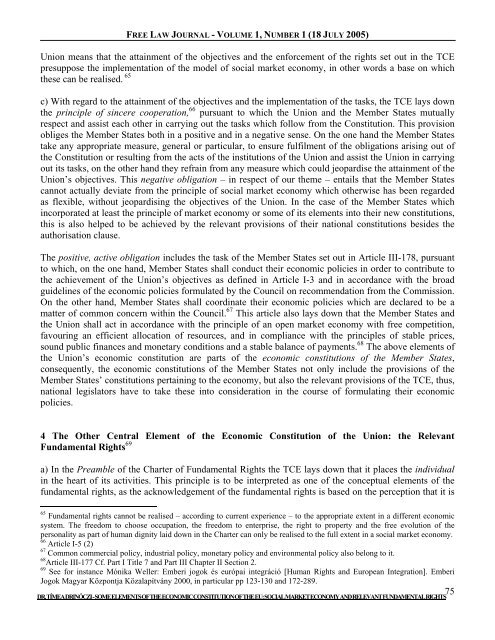Free_Law_Journal-Vol.. - Free World Publishing Inc.
Free_Law_Journal-Vol.. - Free World Publishing Inc.
Free_Law_Journal-Vol.. - Free World Publishing Inc.
Create successful ePaper yourself
Turn your PDF publications into a flip-book with our unique Google optimized e-Paper software.
FREE LAW JOURNAL - VOLUME 1, NUMBER 1 (18 JULY 2005)<br />
Union means that the attainment of the objectives and the enforcement of the rights set out in the TCE<br />
presuppose the implementation of the model of social market economy, in other words a base on which<br />
these can be realised. 65<br />
c) With regard to the attainment of the objectives and the implementation of the tasks, the TCE lays down<br />
the principle of sincere cooperation, 66 pursuant to which the Union and the Member States mutually<br />
respect and assist each other in carrying out the tasks which follow from the Constitution. This provision<br />
obliges the Member States both in a positive and in a negative sense. On the one hand the Member States<br />
take any appropriate measure, general or particular, to ensure fulfilment of the obligations arising out of<br />
the Constitution or resulting from the acts of the institutions of the Union and assist the Union in carrying<br />
out its tasks, on the other hand they refrain from any measure which could jeopardise the attainment of the<br />
Union’s objectives. This negative obligation – in respect of our theme – entails that the Member States<br />
cannot actually deviate from the principle of social market economy which otherwise has been regarded<br />
as flexible, without jeopardising the objectives of the Union. In the case of the Member States which<br />
incorporated at least the principle of market economy or some of its elements into their new constitutions,<br />
this is also helped to be achieved by the relevant provisions of their national constitutions besides the<br />
authorisation clause.<br />
The positive, active obligation includes the task of the Member States set out in Article III-178, pursuant<br />
to which, on the one hand, Member States shall conduct their economic policies in order to contribute to<br />
the achievement of the Union’s objectives as defined in Article I-3 and in accordance with the broad<br />
guidelines of the economic policies formulated by the Council on recommendation from the Commission.<br />
On the other hand, Member States shall coordinate their economic policies which are declared to be a<br />
matter of common concern within the Council. 67 This article also lays down that the Member States and<br />
the Union shall act in accordance with the principle of an open market economy with free competition,<br />
favouring an efficient allocation of resources, and in compliance with the principles of stable prices,<br />
sound public finances and monetary conditions and a stable balance of payments. 68 The above elements of<br />
the Union’s economic constitution are parts of the economic constitutions of the Member States,<br />
consequently, the economic constitutions of the Member States not only include the provisions of the<br />
Member States’ constitutions pertaining to the economy, but also the relevant provisions of the TCE, thus,<br />
national legislators have to take these into consideration in the course of formulating their economic<br />
policies.<br />
4 The Other Central Element of the Economic Constitution of the Union: the Relevant<br />
Fundamental Rights 69<br />
a) In the Preamble of the Charter of Fundamental Rights the TCE lays down that it places the individual<br />
in the heart of its activities. This principle is to be interpreted as one of the conceptual elements of the<br />
fundamental rights, as the acknowledgement of the fundamental rights is based on the perception that it is<br />
65 Fundamental rights cannot be realised – according to current experience – to the appropriate extent in a different economic<br />
system. The freedom to choose occupation, the freedom to enterprise, the right to property and the free evolution of the<br />
personality as part of human dignity laid down in the Charter can only be realised to the full extent in a social market economy.<br />
66 Article I-5 (2)<br />
67 Common commercial policy, industrial policy, monetary policy and environmental policy also belong to it.<br />
68 Article III-177 Cf. Part I Title 7 and Part III Chapter II Section 2.<br />
69 See for instance Mónika Weller: Emberi jogok és európai integráció [Human Rights and European Integration]. Emberi<br />
Jogok Magyar Központja Közalapítvány 2000, in particular pp 123-130 and 172-289.<br />
DR. TÍMEA DRINÓCZI - SOME ELEMENTS OF THE ECONOMIC CONSTITUTION OF THE EU: SOCIAL MARKET ECONOMY AND RELEVANT FUNDAMENTAL RIGHTS 75
















